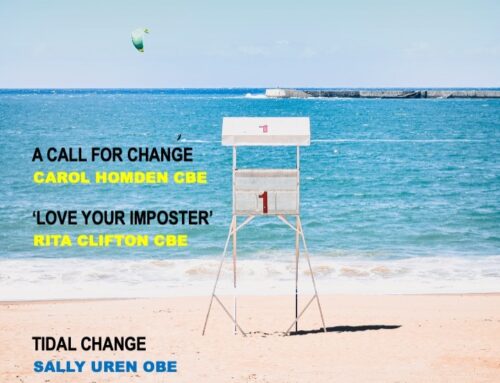Compassionate Capitalism

The impact of the Covid-19 pandemic is global and unprecedented, and looking at the crisis, two major things have struck me. First, that, as in any crisis, we have seen the best (and sometimes the worst) in the business community. Thankfully, many of our leaders have stepped up, with many exemplars of kindness. Secondly, due to various governments’ massive interventions, we have an opportunity to reassess how our societal and commercial systems operate in the future. Covid-19 has bulldozed through the notion that pure capitalism, where individualism and competition are paramount, is enough for societies to function. When confronted with a crisis, we see that we can only endure if we also display solidarity and collectivism, as part of our capitalist approach. This points to why ‘Compassionate Capitalism’ must become the mantra for the future to deliver prosperity for all.
The Covid-19 crisis will prompt a broader discussion about the kind of world we want to live in. It will force us to ask ourselves if we can collaborate differently to address another great emergency, climate change. It’s pushing us to consider the UK’s future role in creating a new positive world order. It’s also giving us cause to ask how the UK Government can intelligently cooperate with business to create opportunities for all citizens. To my mind, the adoption of Compassionate Capitalism addresses these questions and provides us with hope that the future can be more sustainable, inclusive and equal. Some micro examples come immediately to mind of a new order in work/lifestyle balance – for flexible and remote working; shared parental leave; reduced international travel; massive reduction of air miles; kinder to employees with unusual routines with people not needing to commute at the same time; parents leaving to get kids at school pick up and remote work in the evening; allowing people with disabilities to contribute fully without discrimination.
So where do we start on the road to Compassionate Capitalism? Looking forward, business must place purpose on par with profit. That means multi-stakeholder focus, in which supporting the interests of customers, employees, suppliers, partners, the community and the environment would ultimately benefit investors. This approach works today—just look at Marc Benioff’s Salesforce, started just 20 years ago and valued at $150bn, doing business the right way with giving back and making a difference at the core. In my own experience at Sage, we changed the beating heart of the company to become the ‘Champion for Entrepreneurs’ and reached out into communities through the Sage Foundation improving the lives of women, young people and retired service people. Sage delivered total shareholder return of over twice that of the FTSE100 during my stewardship. Before this I witnessed the impact at Micro Focus where the share price increased by 600% in under 4 years.
Put simply, companies must embrace responsibility to all stakeholders for the long-term rather than the narrow goal of short-term profit and myopic view on the share price. Making this switch requires true leadership but we are at a critical juncture where we will separate those who are sincere about a more responsible model from those who are yet to fully commit to purposeful business. Covid-19 can, for many business leaders, be a rare blank canvas. It’s a chance to reshape business into something that works better for everyone.
Turning to an obvious question, we need to also ask how Government can encourage Compassionate Capitalism. While the Government never expected the Covid-19 pandemic, it has taken a very direct role in solving the challenge with the massive public bail-out for businesses, employees and self-employed. Next, we need a forward-looking Industrial strategy for Britain – aligning business and the public sector where we place more wood behind fewer arrows. The Government and Business can orchestrate the equivalent of a Marshall Plan effort with co-ordinated major private sector investment for critical infrastructure and the regions. Government can take this role as a ‘lightening rod’ for the future – for example, by 2030, it is predicted that 50% of UK’s GDP can come from the Knowledge based economy – including Creative, Digital, Technology where high value jobs and sustainable competitive advantage can be created.
The current Government has shown its willingness to deploy over £300bn of taxpayer’s money to shore up the economy. This very act of a massive public ‘bail out’ has changed the landscape forever and now is the time to shape a more collaborative, inclusive, prosperous future for all. Government cannot ‘leave the pitch’ after the crisis to move back to ‘laissez faire’ and turn its back on the public bail-out. The stage is open for Government to take a role to build a coalition of aligned parties to galvanize around a coherent and innovative Industrial Strategy. Ironically, this is perfect timing with a new open world outside EU to build Britain’s role where ‘globalisation’ and lowest cost is challenged. It would be transformational, and incredibly energising, if this Covid-19 crisis sowed seeds of radical new thinking for a clear vision for Britain’s future.
As part of this, the Government (and all Government saddled with massive deficits) should demand that companies pay their taxes – there should be no more tax avoidance or clever structures with millions of fees paid to accounting firms. Boards of UK companies should be compelled and proud to contribute to funding great UK public services through the tax system and overseas companies should pay their taxes fairly on their UK activity. No ‘ifs’, no ‘buts’.
This article is an unabashed rallying call for Compassionate Capitalism and a New Order to sit at the heart of our future. As the leaders of today, we can shape tomorrow, and we can really decide ourselves what we want to be and design the future the way it should be – it is our greater responsibility as well as running our companies. We might not achieve all these objectives, but we certainly can use this crisis to build, collaboratively and compassionately, a more skilled, inclusive, equal, fairer, diverse and tolerant society for all and be able to withstand future global shocks better.
Stephen Kelly
Twitter: @skellyceo
Instagram: @skellyceo
Facebook: @skellyceo
Wiki: https://en.wikipedia.org/wiki/Stephen_
Kelly_(businessman)
Email: [email protected]

Compassionate Capitalism

The impact of the Covid-19 pandemic is global and unprecedented, and looking at the crisis, two major things have struck me. First, that, as in any crisis, we have seen the best (and sometimes the worst) in the business community. Thankfully, many of our leaders have stepped up, with many exemplars of kindness. Secondly, due to various governments’ massive interventions, we have an opportunity to reassess how our societal and commercial systems operate in the future. Covid-19 has bulldozed through the notion that pure capitalism, where individualism and competition are paramount, is enough for societies to function. When confronted with a crisis, we see that we can only endure if we also display solidarity and collectivism, as part of our capitalist approach. This points to why ‘Compassionate Capitalism’ must become the mantra for the future to deliver prosperity for all.
The Covid-19 crisis will prompt a broader discussion about the kind of world we want to live in. It will force us to ask ourselves if we can collaborate differently to address another great emergency, climate change. It’s pushing us to consider the UK’s future role in creating a new positive world order. It’s also giving us cause to ask how the UK Government can intelligently cooperate with business to create opportunities for all citizens. To my mind, the adoption of Compassionate Capitalism addresses these questions and provides us with hope that the future can be more sustainable, inclusive and equal. Some micro examples come immediately to mind of a new order in work/lifestyle balance – for flexible and remote working; shared parental leave; reduced international travel; massive reduction of air miles; kinder to employees with unusual routines with people not needing to commute at the same time; parents leaving to get kids at school pick up and remote work in the evening; allowing people with disabilities to contribute fully without discrimination.
So where do we start on the road to Compassionate Capitalism? Looking forward, business must place purpose on par with profit. That means multi-stakeholder focus, in which supporting the interests of customers, employees, suppliers, partners, the community and the environment would ultimately benefit investors. This approach works today—just look at Marc Benioff’s Salesforce, started just 20 years ago and valued at $150bn, doing business the right way with giving back and making a difference at the core. In my own experience at Sage, we changed the beating heart of the company to become the ‘Champion for Entrepreneurs’ and reached out into communities through the Sage Foundation improving the lives of women, young people and retired service people. Sage delivered total shareholder return of over twice that of the FTSE100 during my stewardship. Before this I witnessed the impact at Micro Focus where the share price increased by 600% in under 4 years.
Put simply, companies must embrace responsibility to all stakeholders for the long-term rather than the narrow goal of short-term profit and myopic view on the share price. Making this switch requires true leadership but we are at a critical juncture where we will separate those who are sincere about a more responsible model from those who are yet to fully commit to purposeful business. Covid-19 can, for many business leaders, be a rare blank canvas. It’s a chance to reshape business into something that works better for everyone.
Turning to an obvious question, we need to also ask how Government can encourage Compassionate Capitalism. While the Government never expected the Covid-19 pandemic, it has taken a very direct role in solving the challenge with the massive public bail-out for businesses, employees and self-employed. Next, we need a forward-looking Industrial strategy for Britain – aligning business and the public sector where we place more wood behind fewer arrows. The Government and Business can orchestrate the equivalent of a Marshall Plan effort with co-ordinated major private sector investment for critical infrastructure and the regions. Government can take this role as a ‘lightening rod’ for the future – for example, by 2030, it is predicted that 50% of UK’s GDP can come from the Knowledge based economy – including Creative, Digital, Technology where high value jobs and sustainable competitive advantage can be created.
The current Government has shown its willingness to deploy over £300bn of taxpayer’s money to shore up the economy. This very act of a massive public ‘bail out’ has changed the landscape forever and now is the time to shape a more collaborative, inclusive, prosperous future for all. Government cannot ‘leave the pitch’ after the crisis to move back to ‘laissez faire’ and turn its back on the public bail-out. The stage is open for Government to take a role to build a coalition of aligned parties to galvanize around a coherent and innovative Industrial Strategy. Ironically, this is perfect timing with a new open world outside EU to build Britain’s role where ‘globalisation’ and lowest cost is challenged. It would be transformational, and incredibly energising, if this Covid-19 crisis sowed seeds of radical new thinking for a clear vision for Britain’s future.
As part of this, the Government (and all Government saddled with massive deficits) should demand that companies pay their taxes – there should be no more tax avoidance or clever structures with millions of fees paid to accounting firms. Boards of UK companies should be compelled and proud to contribute to funding great UK public services through the tax system and overseas companies should pay their taxes fairly on their UK activity. No ‘ifs’, no ‘buts’.
This article is an unabashed rallying call for Compassionate Capitalism and a New Order to sit at the heart of our future. As the leaders of today, we can shape tomorrow, and we can really decide ourselves what we want to be and design the future the way it should be – it is our greater responsibility as well as running our companies. We might not achieve all these objectives, but we certainly can use this crisis to build, collaboratively and compassionately, a more skilled, inclusive, equal, fairer, diverse and tolerant society for all and be able to withstand future global shocks better.
Stephen Kelly
Twitter: @skellyceo
Instagram: @skellyceo
Facebook: @skellyceo
Wiki: https://en.wikipedia.org/wiki/Stephen_
Kelly_(businessman)
Email: [email protected]




